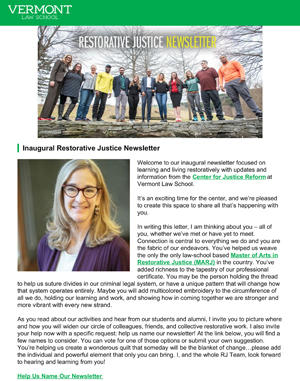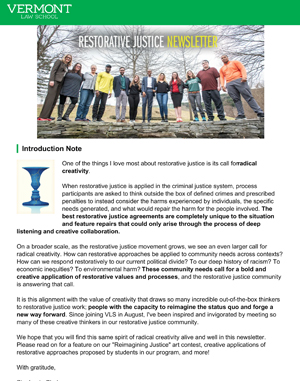The Center for Agriculture and Food Systems at Vermont Law School and the Cuban American Friendship Society this week named VLS student Gregory Berry '16 the 2016-2017 Cuba-Vermont Agriculture and Food Systems Fellow. The fellowship announcement comes on the heels of President Obama's historic trip to Cuba and greenlights Berry's research proposal to explore the parallels between agriculture and food systems in Cuba and Vermont.
Titled "Growing with Integrity: Legal Methods to Bolster Sustainable Organic Agricultural Markets in Cuba and Vermont," Berry's proposed research provides a unique opportunity for Vermont Law School—and Vermont—to engage with Cuba on a critical global issue.
"Cuba is a leader in sustainable agriculture, adopting agroecology practices countrywide," said VLS Professor Jared Carter, founding member of the Cuba Working Group at VLS and co-sponsor of the fellowship. "In light of Vermont's leadership in sustainable agriculture and food systems, we are uniquely positioned to engage with our Cuban counterparts to further knowledge about generative agriculture. The recent improvement in U.S.-Cuba relations provides an important opportunity to learn from each other about the ways in which we can produce food for a growing global population while stewarding Earth's resources stressed by climate change."
Berry co-chairs the Environmental Law Society at VLS. His research will result in practical scholarship focused on parallels between food systems in Cuba and Vermont. The fellowship will enable him to delve into the legal landscapes that small-scale farmers in Cuba and Vermont face on a daily basis, from agricultural product branding to leveraging production in cooperative and community-based agriculture economies.
"Vermont and Cuba have pioneered sustainable food systems despite the challenges of a powerful industrial food system, which prioritizes large-scale production above local community and sustainable growth," said Professor Laurie Ristino, director of the Center for Agriculture and Food Systems and fellowship co-sponsor. "In the United States, federal laws and policies over time have resulted in a 'get big or get out' approach to agriculture. Gregory's work will look at what Cuba and Vermont are getting right and identify legal structures that support sustainable agriculture."
For more information about the Cuba-Vermont Agriculture and Food Systems Fellowship, email jcarter@vermontlaw.edu or lristino@vermontlaw.edu. For more information about the Center for Agriculture and Food Systems at Vermont Law School, visit vermontlaw.edu/cafs.
###
Vermont Law School, a private, independent institution, is home to the nation's premier environmental law program. VLS offers a Juris Doctor curriculum that emphasizes public service; three Master's Degrees—Master of Environmental Law and Policy, Master of Energy Regulation and Law, and Master of Food and Agriculture Law and Policy; and four post-JD degrees —LLM in American Legal Studies (for foreign-trained lawyers), LLM in Energy Law, LLM in Environmental Law, and LLM in Food and Agriculture Law. The school features innovative experiential programs and is home to the Environmental Law Center, South Royalton Legal Clinic, Environmental and Natural Resources Law Clinic, Energy Clinic, Food and Agriculture Clinic, and Center for Applied Human Rights. For more information, visit vermontlaw.edu, find us on Facebook, and follow us on Twitter.


















